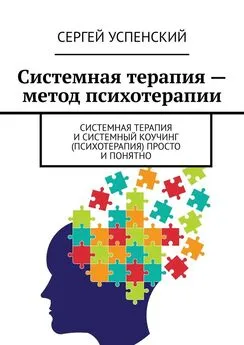Карл Роджерс - Клиентоцентрированная терапия
- Название:Клиентоцентрированная терапия
- Автор:
- Жанр:
- Издательство:Рефл-бук, Ваклер
- Год:1997
- Город:Москва
- ISBN:5-87983-027-6
- Рейтинг:
- Избранное:Добавить в избранное
-
Отзывы:
-
Ваша оценка:
Карл Роджерс - Клиентоцентрированная терапия краткое содержание
В книге изложена теория личности К. Роджерса как основание разработанного им психотерапевтического подхода — клиентоцентрированной терапии.
Прикладные аспекты данного метода представлены в главах, написанных сподвижниками К. Роджерса — Э. Дорфман (Игровая терапия), Н. Хоббсом (Группоцентрированная терапия) и Т. Гордоном (Вопросы лидерства и управленческого администрирования).
Клиентоцентрированная терапия - читать онлайн бесплатно полную версию (весь текст целиком)
Интервал:
Закладка:
Golden, C. S., and H. J. Ruttenbeig. Labor and management responsibility for production efficiency. In Т. M. Newcomb, and E. L. Hartley, Reading? in Social Psychology. New York: Henry Holt, 1947, 461-465. (Reprinted from The Dynamics of Industrial Democracy. New York: Harper and Bros., 1942.)
Goldstein, Kurt. Human Nature in the Light of Psychopathology. Cambridge: Harvard University Press, 1940.
Gordon, Thomas. What is gained by group participation. Educ. Leadership, 1950, 7, 220-226.
Gorlow, Leon. Nondirective group psychotherapy: an analysis of the behavior of members as therapists. Ph.D. thesis. Teachers College, Columbia University, 1950.
Haigh, Gerard, and Bill L. Kell. Multiple therapy as a method for training and research in psychotherapy. /. Abnorm. & Soc. Psychol (accepted for publication).
Hobbs, Nicholas. Nondirective group therapy. /. Natl Assn. of Deans of Women, 1949, 12, 114-121.
Hoch, Erasmus L. The nature of the group process in non-directive group psychotherapy. Ph.D. thesis. Teachers College, Columbia University, 1950.
Hogan, Richard. The development of a measure of client defensive-ness in a counseling relationship. Ph.D. thesis, University ot Chicago, 1948.
Hogan, Richard. The development of a measure of client defensive-ness in the counseling relationship. Ph.D. thesis abstract, University of Chicago, 1948.
Homey, Karen. Self Analysis. New York: W.W. Norton, 1942.
Hunt, J. McV. Personality and the Behavior Disorders. 2 vols. New York: Ronald Press, 1944.
Ichheiser, Gustav. Misunderstandings in Human Relations. Chicago: University of Chicago Press, 1949.
Jaques, Elliott. Interpretive group discussion as a method of facilitating social change. Human Relations, 1948, 1, 533-549.
Jaques, Elliott, ed. Social therapy. / Social Issues, 1947, 3, 67 pp.
Jaques, Elliott. Some principles of organization of a social therapeutic institution. J. Social Issues, 1947, 3, 4-10.
Klein, Melanie. The Psycho-analysis of Children, London: Hogarth Press, 1937.
Kluckhohn, Clyde, and H. A. Murray, editors. Personality in Nature, Society and Culture. New York: Knoff, 1948.
Krech, David, and R. S. Crutchfield. Theory and Problems of Social Psychology. New York: McGraw-Hill, 1948.
Landisberg, Selma, and W. U. Snyder. Non-directive play therapy. J. Clin. Psychol., 1946, 2, 203-213.
Lecky, Prescott. Self-Consistency: a Theory of Personality. New York: Island Press, 1945.
Leeper, Robert W. A motivational theoiy of emotion to replace "emotion as disorganized response." Psychol. Rev., 1948, 55, 5-21.
Leeper, Robert W. Cognitive and symbolic processes. Unpublished manuscript.
Lewin, Kurt, and Paul Grabbe. Conduct, knowledge and acceptance of new values. /. Social Issues, 1945, 1, 53-64.
Lippitt, Ronald, and R. K. White. The "social climate" of children's groups. Chapter XXVIII in R. Barker, J. Kounin, and H. Wright. Child Development and Behavior. New York: McGraw-Hill, 1943.
McCleary, R. A., and R. S. Lazarus. Autonomic discrimination without awareness. /. Pers., 1949, 18, 171-179.
McGinnies, Elliott. Emotionality and perceptual defense. Psychol. Rev., 1949, 56, 244-451.
McGregor, Douglas. Conditions of effective leadership in the industrial organization. In Т. M. Newcomb, and E. L. Hartley, Readings in Social Psychology. New York: Henry Holt, 1947, 427-435. (Reprinted from /. Consult: Psychol. 1944, 8, 55-63.)
Maslow, A. H. Dymanics of personality organization. Psychol. Rev., 1943, 50, 514-539, 541-558.
Maslow, A. H. A theory of human motivation. Psychol. Rev., 1943, 50, 370-396.
Masserman, J. H. Principles of Dynamic Psychiatry. New York: Saunders, 1946.
Mayo, Elton. The Social Problems of an Industrial Civilization. Boston: Division of Research, Harvard University Graduate School of Business Administration, 1945.
Mowrer, О. H., and Clyde Kluckhohn. A dynamic theory of personality. Chapter III in J. McV. Hunt, Personality and the Behavior Disorders, vol. 1. New York: Ronald Press, 1944.
Murphy, Gardner. Personality: a Biosocial Approach to Origins and Structure. New York: Harper and Bros., 1947.
Newcomb, Т. M. Autistic hostility and social reality. Human Relations, 1947, 1, 69-86.
Pearse, I. H., and Lucy H. Crocker. The Peckham Experiment: a Study in the Living Structure of Society. London: George Alien and Unwin, Ltd., 1943.
Peres, H. An investigation of nondirective group therapy. /. Consult. Psychol, mi, 11, 159-172.
Porter, E. H., Jr. An Introduction to Therapeutic Counseling. Boston: Houghton Mifflin, 1950.
Postman, L.; J. S. Bruner, and E. McGinnies. Personal values as selective factors in perception. /. Abnorm. & Soc. Psychol, 1948, 43, 142-154.
Radke, Marian, and Dayria Klisurich. Experiments in changing food habits. /. Amer. Dietetic Assn., 1947, 23, 403-409.
Rank, Otto. Will Therapy; and Truth and Reality. New York: Knopf, 1945.
Recommended graduate training program in clinical psychology. Report of the Committee on Training in Clinical Psychology of the American Psychological Association, Amer. Psychologist, mi, 2, 539-558.
Reik, Theodor. Listening with the Third Ear. New York: Farrar, Straus, 1948.
Ribble, Margaret A. Infantile experience in relation to personality development. Chapter XX in J. McV. Hunt, Personality and the Behavior Disorders, vol. 2. New York: Ronald Press, 1944.
Roethlisberger, F. J., and W. J. Dickson. Management and the Worker. Cambridge: Harvard University Press, 1939.
Rogers, Carl R. Counseling and Psychotherapy. Boston: Houghton Mifflin, 1942.
Rogers, Carl R. Divergent trends in methods of improving adjustment. Harvard Educ.Rev., 1948, 209-219.
Rogers, Carl R. Some implications of client-centered counseling for college personnel work. Educ. & Psychol Measmt, 1948, 8, 540-549.
Rogers, Carl R. The use of electrically recorded interviews in improving psychotherapeutic techniques. Amer, J. Orthopsychiat., 1942,12,429-434.
Seeman, Julius. A study of the process of nondirective therapy. /. Consult. Psychol, 1949, 13, 157-168.
Shedlin, Arthur J. The Effectiveness of Group Climate: an Experiment in Human Relations. National Conference of Christians and Jews, Inc., 1948.
Sheerer, Elizabeth T. An analysis of the relationship between acceptance of and respect for self and acceptance of an respect for others in seven counseling cases. Ph.D. thesis, University of Chicago, 1949.
Sheerer, Elizabeth T. An analysis of the relationship between acceptance of and respect for self and acceptance of and respect for others in ten counseling cases. /. Consult. Psychol, 1949, 13, 169-175.
Snyder, W. U., et al. Casebook of Non-directive Counseling. Boston: Houghton Mifflin, 1947.
Snygg, Donald, and Arthur W. Combs. Individual Behavior: a New Frame of Reference for Psychology. New York: Harper and Bros., 1949.
Stephenson, W. Introduction to inverted factor analysis, with some applications to studies in orexis. /. Educ. Psychol, 1936, 27, 353-367.
Stephenson,W. Methodological consideration of Jung's typology. /. Ment. Scl, 1939, 85, 195-205.
Sullivan, H. S. Conceptions of Modern Psychiatry. Washington, D.C.: W. A. White Foundation, 1945.
Survey Research Center Study No. 6. Selected findings from a study of clerical workers in the Prudential insurance company of America. Human Relations, University of Michigan, 1948.
Taft, Jessie. The Dynamics of Therapy in a Controlled Relationship. New York: Macmillan, 1933.
Tavistock Institute of Human Relations. Two research projects on human relations in industry. Document No. 173, January 1949.
Telschow, Earl. The role of the group leader in nondirective group psychotherapy. Ed. D. project, Teachers College, Columbia University, 1950.
Thelen, H. A., and John Withall. Three frames of reference: the description of climate. Human Relations, 1949, 2, 159-176.
Travis, L., and D. Baruch. Personal Problems of Everyday Living. New York: Appleton-Century, 1941.
Whitaker, Carl. Teaching the practicing physician to do psychotherapy. Southern Med. J., 1949, 42, 809-903.
Whitaker, C. A.; J. Warkentin, and N. Johnson. A philosophical basis for brief psychotherapy. Psychiatric Quarterly, 1949, 23, 439-443.
92a. White, Robert W. The Abnormal Personality. New York: Ronald Press, 1948.
Withall, John. The development of a technique for the measurement of social-emotional climate in classrooms. /. Exp. Educ, 1949, 347-361.
Witmer, H. L,, ed. Teaching Psychotherapeutic Medicine. New York: Commonwealth Fund, 1947.

Примечания
1
По материалам специального выпуска Журнала гуманистической психологии: Journal of Humanistic Psychology, 1995, vol.35, No.4, p.40-54.
2
Carl Rogers: Dialogues: Boston, Houghton Mifflin Company, 1989.
3
Rogers.On Becoming Person. Boston: Houghton Mifflin, 1961.
4
Rogers, Dymond (Eds.), Psychotherapy and Personality Change. Chicago: University of Chicago Press, 1954, p. 12—24.
5
Rogers, Psychotherapy and Personality Change.
6
Rogers, Client-Centered Therapy. Boston: Houghton Mifflin, 1951.
7
Fiedler, A comparison of the therapeutic relationship in psychoanalytic, non-directive and Adlerian therapy, Journal of Consulting Psychology, 1950, 14, p.436-445; Luborsky, Who is helped by psychotherapy? Harvard Mental Health Letter, 1989, 7(2), p.4; Lambert, Implications of outcome research for psychotherapy integration. Handbook of Psychotherapy Integration. New York: Basic Books, 1992.
8
Rogers, Client-Centered Therapy.
9
Carl Rogers on encounter groups. New York: Harper and Row, 1970; Rogers, Becoming Partners. New York: Dell, 1972; Carl Rogers on personal power. New York: Delacorte, 1977; Rogers, A Way of Being. Boston: Houghton Mifflin, 1980.
10
Rogers, Towards a more human science of the person. Journal of Humanistic Psychology, 1985, 26(3), p.7-24.
11
См. например, обсуждение демократии в широких массах или высвобождения человеческих энергий в: David Е. Lilienthal, TVA -Democracy on the March.
12
См. главы, написанные учениками и сподвижниками К.Роджерса. — Прим. ред.
13
Как следует называть человека, с которым имеет дело терапевт? Обычно использовались такие термины, как "пациент", "субъект", "консультируемый", "исследуемый". Но мы все больше и больше используем термин "клиент", вплоть до того, что ввели его в само название "клиентоцентрированной терапии". Выбор объясняется тем, что несмотря на недостатки его словарного значения и этимологии, термин этот, пожалуй, лучше всего передает образ этого человека, как мы его видим. "Клиент" как термин с устоявшимся значением означает человека, самостоятельно и добровольно пришедшего за помощью в решении проблемы, ни в коем случае не снимая с себя ответственности за ситуацию. Именно из-за этих оттенков значения мы и выбрали данный термин, так как он исключает соозначение человека больного, объекта эксперимента и т.п. К сожалению, термин "клиент" все же имеет некоторые правовые оттенки, и если будет предложен более подходящий термин, мы охотно примем его. Однако пока термин "клиент" наиболее соответствует нашей концепции человека, пришедшего за помощью.
Читать дальшеИнтервал:
Закладка:










